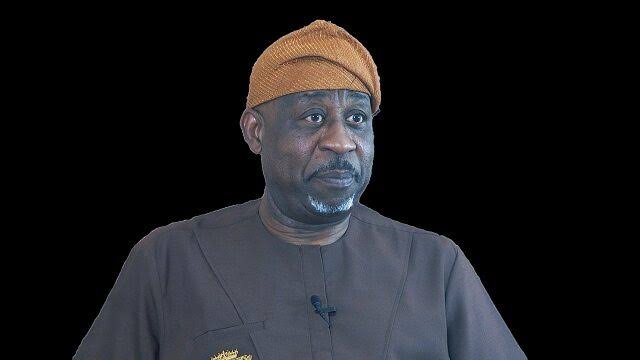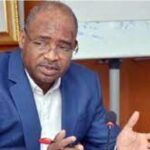
To make positive impacts, SAMI OLATUNJI writes that the new Minister of Solid Minerals ,Dele Alake, must find a lasting solution to illegal mining
The Economic and Financial Crimes Commission arrested 13 Chinese nationals last month in Ilorin, Kwara State, for allegedly indulging in unlawful mining activities. In addition, the Nigeria Security and Civil Defence Corps apprehended at least 21 suspected illegal miners in Cross River State in May of this year. The suspects were apprehended by NSCDC personnel in cooperation with the Federal Ministry of Mines and Steel Development in the Utanga village of the Obanliku Local Government Area. The regular news of arrests demonstrates that the country is dealing with a severe problem of illegal mining.
Illegal mining is rife from Itagunmodi to Igun, Iyere, Igila, and other poor, gold-bearing areas in Osun State, and Kwali, Daki Takwas, Zugu, Wawan Icce, Yan Kaura, and other gold-bearing communities in Zamfara State, among other places. The Federal Government has disclosed that unlawful mining costs the country $9bn each year, with the only money coming from a 3 percent royalty paid by the few licensed miners. Despite possessing a sizable reserve, Nigeria, Africa’s powerhouse, is absent from the list of major players. Only Ghana, which was able to develop its solid minerals sector, was the only African country among the world’s top ten gold producers.
Nigeria’s vast mineral deposit
Nigeria is blessed with many minerals, in addition to limestone, crude, and a few others that are already being exploited. Garba revealed that there are about 44 mineral types in 450 locations across the 774 local governments, adding that until their economic quantity was ascertained, they should be regarded as occurrences rather than deposits, even though they have the potential for development.
The Director-General of the Nigerian Geological Survey Agency, the agency saddled with the responsibility of generating the geoscience data, Dr Abdulrazaq Garba, recently said Nigeria has “very vast” gold with occurrences in Niger, Osun, Kebbi, Kaduna, Kogi, Kwara, Zamfara, Katsina, Kano, Nasarawa and Bauchi states and the Federal Capital Territory, while Wolframite has occurrences in Kaduna, Kano, Bauchi, Niger, Kwara, Zamfara and Nasarawa states; same way Lithium has “vast” occurrences and could be found in Nasarawa, Kwara, Kaduna, Niger, and Zamfara states.
In Ebonyi, Zamfara, and Plateau states, some parts of Benue State and the FCT, there is silver, while Copper associated with minerals like lead could be found in Bauchi, Zamfara, FCT, and parts of Nasarawa State.
He added, “We also have platinum group elements, cobalt, and graphite and from our geophysical investigation, the quality of the graphite we have is good.”
NEITI also added that mineral occurrences in Nigeria include granite aggregate, Laterite, Coal, Shale, Columbite, Tin Ore, Gypsum, Feldspar, Marble, Dolomite, Tantalite, Kaoline, Fluorite, QUARTZ, Basalt, Talc, Manganese, Barites, Zircon, and precious stones like Tourmaline, Topaz, Sapphire, Amethyst and Garnet.
Meanwhile, despite being rich in these high-valued minerals, Nigeria has not only left them in the hands of illegal miners, it also spends its limited forex to import some of the minerals.
“That is the irony of Nigeria; it imports what it has in abundance and leaves its own resources untapped,” said Dr Akinwumi Adesina, the President of the African Development Bank, in his virtual address at the inauguration of Rotimi Akeredolu as governor of Ondo State in February 2021.
For example, Nigeria has a huge bitumen deposit – the largest in Africa and one of the largest in the world, but the former Minister of Works and Housing, Babatunde Fashola, revealed that government spends millions of dollars to import 500,000 metric tonnes of bitumen for road construction annually.
Adesina noted in the address, “The total value of bitumen reserves in Nigeria could be worth up to $1.5tn, with an estimated 16 billion barrels in Ondo State. The potential state wealth from bitumen alone could be worth $657bn. The paradox, however, is that Nigeria spends over N300bn importing bitumen.”
While many countries, including Ghana, South Africa, Botswana, Democratic Republic of Congo, Guinea Bissau and Asian countries like China and European countries like Russia, have attracted big investors to mine their gold and generate sizeable revenue from the value chain, Nigeria only begun the process of coming up with the all-important geoscience data a few years ago.
The NGSA DG affirmed that the absence of the data had made the sector unattractive to big investors. He, however, pointed out that the National Integrated Mineral Exploration Project, anchored by the ministry and the agency, focused on generating the data.
Government’s effort
To solve the problem, the former President, Muhammadu Buhari, in October 2020 set up a mining police comprising the Inspector-General of Police, Chief of Army Staff, National Security Adviser, and others, but one year after, the illicit act continued unabated.
Even when Buhari banned mining activities in Zamfara State and declared the state a “no-fly zone” due to worsening insecurity, the illegal miners simply relocated to Osun State to continue their illegal activity.
Instructively, after the ban, two Chinese were arrested for illegal mining. Adegbite later revealed that the miners were working for “Nigerians in high positions of authority” who pressured the government to release them.
So far, hundreds of illegal gold miners have been arrested, including some Chinese nationals, but the activity festers like a bad sore. On May 4, 2020, alone, 17 Chinese, 10 locals, and one community leader were arrested in Ilesa and Ife areas by the Amotekun corps.
“The Chinese are the main culprits. Taking gold out of Nigeria illegally is economic sabotage because if you look at the quantum, the value is huge,” he added.
With the vast revenue the country was losing, the former Minister of State in the Ministry of Mines and Steel Development, Uche Ogah, advocated capital punishment for the culprits. He lamented that private jet owners were aiding gold smuggling.
The Federal Government, through the Ministry of Mines and Steel Development, introduced biometric data capture for registered artisanal and small-scale miners, which would lessen the rate of illegal mining and smuggling in the country.
According to the former Minister of Mines and Steel Development, Olamilekan Adegbite, the data capturing ecosystem “will minimize the high rate of illegal mining and smuggling, increase Government’s revenue from the resource, create jobs, and improve environmental and social stewardship.”
Experts’ view
The President, Nigerian Mining and Geosciences Society, Prof Akinade Olatunji, said that illegal mining is extracting mineral resources at whatever volume without the necessary approval from the statutory regulatory authorities.
He added, “as government loses revenue, the activities of the miners also bring instability to the community where they operate, in terms of environmental degradation, because they don’t operate under the principles set out by the government. They continue to pollute the environment with impunity. They take and disappear, polluting the water bodies and farmland in the process.
“Most times, people don’t even know where these illegal miners come from. They enter a community and create problems, which is why every country frowns at people engaging in illegal mining.”
He urged the government to implement the law against illegal mining and ensure that it is strictly followed.
An economist and former two-time Minister of Finance, Dr Kalu Idika Kalu, earlier said the government should develop the right policies to curb the leakages, encourage people to develop the minerals and maximise the value chain.
He added, “We can’t be so poor and people are coming to steal our gold while the government gets nothing. These minerals can be converted into secondary and tertiary products. I was surprised when I heard that some crucial parts of an aircraft are produced from minerals being exploited from all over the place. These are minerals many Nigerians don’t even know about.”
The Aare Ona Kakanfo of Yoruba land, Gani Adams, last month called on President Bola Tinubu to tackle illegal mining in the country, which he said was responsible for the loss of billions of dollars annually.
Adams made the call in a statement made available on Friday by his Special Assistant on Media, Kehinde Aderemi, adding that the newly signed electricity reform bill and students’ educational loans were noble initiatives that would guarantee effective power generation, supply, distribution, and engender growth across all sectors.
He said, “A special revenue generation committee should be established to work on the modalities of the money that can be generated through special tax from multinational companies and other investors in Nigeria. This will reduce crime in the country and also reduce the spate of insecurity.
“This committee should also be empowered to stop illegal mining going on in some parts of the country. From Zamfara to Oyo, Enugu to Kebbi, Osun to Rivers, illegal miners are on the rampage and the government is losing billions of dollars every year.
“It is ridiculous and embarrassing that the majority of these perpetrators are foreigners, backed by some unpatriotic and selfish Nigerians. If this menace can be appropriately and effectively tackled with the use of force and legal sanctions, federal and state governments will be making tens of billions of dollars yearly.”
Adams also urged Tinubu to work out an action plan that would reduce oil theft across the country and prosecute those responsible for it.
Stakeholders expect the new Minister of Solid Minerals, Dele Alake, to prioritize tackling illegal mining to ensure Nigeria benefits from its vast mineral deposits and boost revenues.










